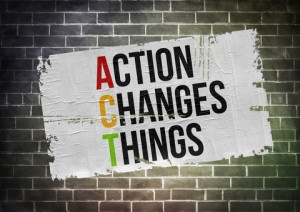Where Does Change Happen? It’s Rarely In Training
If education is always to be conceived along the same antiquated lines of a mere transmission of knowledge, there is little to be hoped from it in the bettering of man’s future. For what is the use of transmitting knowledge if the individual’s total development lags behind?
Maria Montessori

Recently while reading a coaching newsletter, the author stimulated my thinking to many connections and some big insights about training and real change. The big idea raised was, is knowledge really power? As educators we love training, we want to sign people up for training for just about any reason; new technology, new processes, new skills, new philosophy, new research…knowledge possibilities everywhere – via training! Frequently, when a teacher or principal is having difficulty meeting the expectations of their job, a supervisor will send them to training. They go obediently and return to their work and few would be surprised that little change, if any, occurs. A new teacher spends 10-20% of their first year in training; 98% is knowledge and information the teacher must do. In 3-5 years, 50% of new teachers have left the profession. What’s wrong…they got all this knowledge?
Knowledge is power; it’s just that knowledge doesn’t change behavior!
We all know lots of things about eating and health, yet we have millions of unhealthy people in our world; we know about the fragileness of our environment, yet most people don’t recycle or carpool or stop using plastic grocery bags. The POWER of knowledge comes from a change in behavior. What do we do that makes visible the knowledge we have?
At Results Coaching our goal is to provide powerful knowledge that energizes and inspires real behavioral change. With each piece of knowledge, we intentionally practice and apply the new learning. And even with our committed intention, participants often leave our seminars and within a few weeks, have been pulled back into old habits and behaviors. Follow up support sessions reignite and rekindle; and again faced with the responsibilities of running schools and districts old behaviors resurface. What can we do? More and more, as districts and school communities realize this dynamic; they have begun to prepare an environment that takes KNOWLEDGE and moves it into practice and application to support long term change of behavior. Some schools offer coaching circles with practice as the goal; others provide time within regular meetings for coaching practice; many PLC’s make sure to monitor their language to intentionally practice using reflective feedback throughout the year. Principals make a poster and hang it in the direction they look when talking to others which serves as a reminder to “really listen” (WAIT); some journal a plan created for a difficult conversation and then reflect on what they did in the conversation to achieve the goal or outcome they wanted; and if not – what will they pay attention to in the next conversation. Others set coaching language goals and gather data from colleagues; just as we ask teachers to use student data. Many take the skills and tools from training and practice with their kids and spouses; the miracle change of a family member is a powerful positive reinforcement to internalizing the skills. All these strategies take KNOWLEDGE to real BEHAVIOR CHANGE. It doesn’t happen in the training class, it happens in the day to day work of leading in the “coach identity.”
What behaviors are we being intentionally focused on that is impacting the change we want?
By Kathryn Kee, PCC